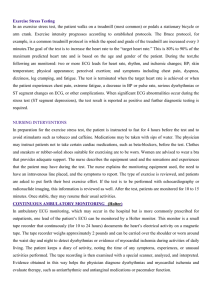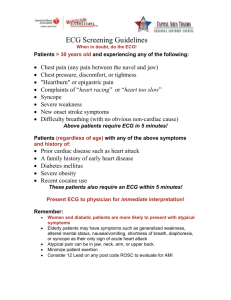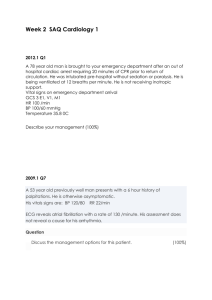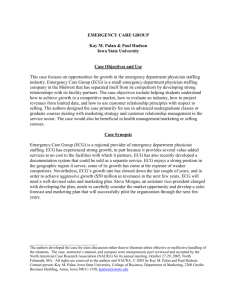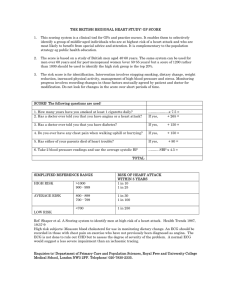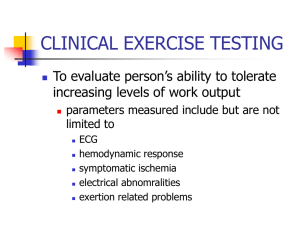Guide to Exercise Electrocardiogram
advertisement
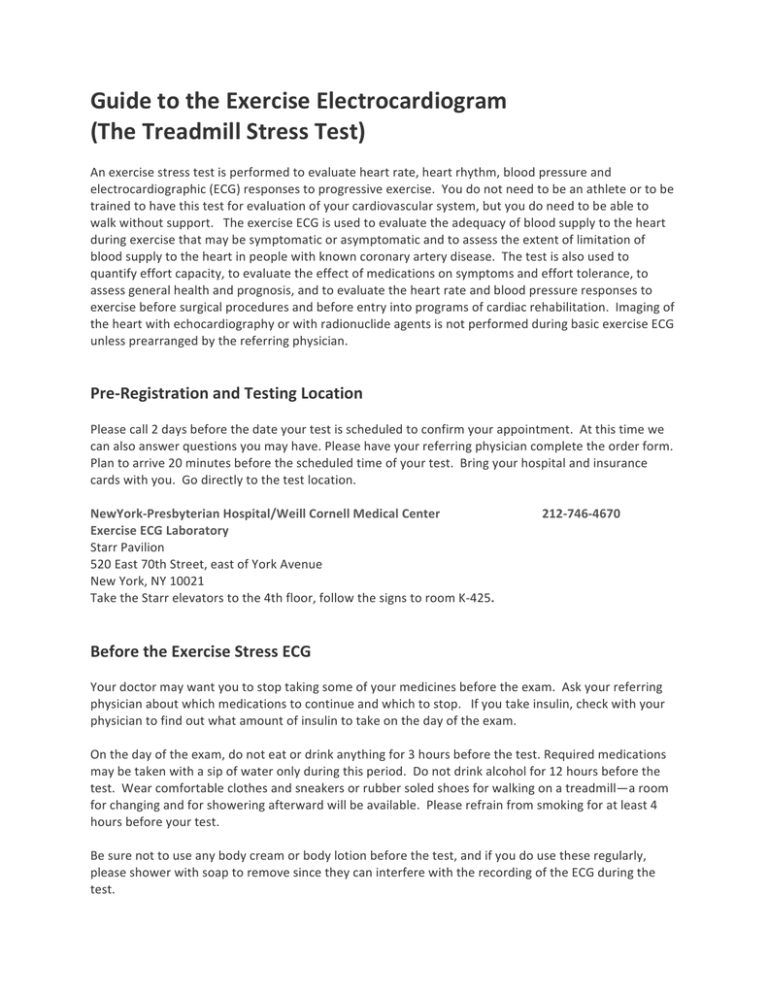
Guide to the Exercise Electrocardiogram (The Treadmill Stress Test) An exercise stress test is performed to evaluate heart rate, heart rhythm, blood pressure and electrocardiographic (ECG) responses to progressive exercise. You do not need to be an athlete or to be trained to have this test for evaluation of your cardiovascular system, but you do need to be able to walk without support. The exercise ECG is used to evaluate the adequacy of blood supply to the heart during exercise that may be symptomatic or asymptomatic and to assess the extent of limitation of blood supply to the heart in people with known coronary artery disease. The test is also used to quantify effort capacity, to evaluate the effect of medications on symptoms and effort tolerance, to assess general health and prognosis, and to evaluate the heart rate and blood pressure responses to exercise before surgical procedures and before entry into programs of cardiac rehabilitation. Imaging of the heart with echocardiography or with radionuclide agents is not performed during basic exercise ECG unless prearranged by the referring physician. Pre-­‐Registration and Testing Location Please call 2 days before the date your test is scheduled to confirm your appointment. At this time we can also answer questions you may have. Please have your referring physician complete the order form. Plan to arrive 20 minutes before the scheduled time of your test. Bring your hospital and insurance cards with you. Go directly to the test location. NewYork-­‐Presbyterian Hospital/Weill Cornell Medical Center 212-­‐746-­‐4670 Exercise ECG Laboratory Starr Pavilion 520 East 70th Street, east of York Avenue New York, NY 10021 Take the Starr elevators to the 4th floor, follow the signs to room K-­‐425. Before the Exercise Stress ECG Your doctor may want you to stop taking some of your medicines before the exam. Ask your referring physician about which medications to continue and which to stop. If you take insulin, check with your physician to find out what amount of insulin to take on the day of the exam. On the day of the exam, do not eat or drink anything for 3 hours before the test. Required medications may be taken with a sip of water only during this period. Do not drink alcohol for 12 hours before the test. Wear comfortable clothes and sneakers or rubber soled shoes for walking on a treadmill—a room for changing and for showering afterward will be available. Please refrain from smoking for at least 4 hours before your test. Be sure not to use any body cream or body lotion before the test, and if you do use these regularly, please shower with soap to remove since they can interfere with the recording of the ECG during the test. During the Exercise Stress ECG Allow at least 1 hour for completion of the test, although only part of this time will involve exercise on the treadmill. You will be asked several questions about your medical history and about your medications. During the exercise ECG, the heart is gently and progressively stressed by slowly increasing the speed and the grade of an exercise treadmill. You will walk throughout the test, slowly on the level at the beginning but faster and progressively uphill as the test continues. There is no running or jogging involved. The test is continued until symptoms limit further exercise or adequate diagnostic information is obtained, but never beyond your willingness to continue. There is careful monitoring of heart rate, blood pressure, heart rate and symptoms before, during, and after exercise. A full electrocardiogram (ECG) is recorded at rest and during several minutes before exercise, after each minute of exercise, and for at least 8 minutes after exercise. Heart rhythm and heart rate are monitored continuously throughout the test. Blood pressure is recorded with each change of speed or grade, or more often if indicated. Symptoms will be monitored carefully throughout. When you reach or near your limit of exercise, or when symptoms or test findings indicate that it is appropriate to end the test, you will return to several minutes of very slow walking on the level to cool off for several minutes before sitting down. The ECG is generally monitored until after the 8th minute of recovery. After the Exercise Stress ECG For most people, heart rate, blood pressure, and symptoms return to near-­‐baseline levels during the 8 minutes of the recovery period. In rare situations, you may be asked to sit for a longer period before being discharged. The exercise test findings undergo further computer processing after the test is completed, then reviewed and interpreted by an attending physician, with a final report generally available for your physician within 24 hours. Contact Coleman Center for Electrocardiography Phone: 212-­‐746-­‐4670
